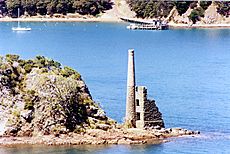Pumphouse ruins facts for kids
Quick facts for kids Pumphouse ruins |
|
|---|---|

Pumphouse ruins on Kawau Island in 2005
|
|
| General information | |
| Address |
|
| Coordinates | 36°26′20.39″S 174°49′48.24″E / 36.4389972°S 174.8300667°E |
| Completed | 1854 |
| Designated: | 23 June 1983 |
| Reference #: | 9 |
The Pumphouse ruins are old stone walls found on Kawau Island in New Zealand. These ruins are what's left of a building that was part of a copper mine. The mine started operating in 1844.
The mine faced many challenges, including problems with its management and constant flooding. To solve the flooding issue, a special building called a pumphouse was built in 1854. This building housed machinery to pump water out of the mine. Today, the ruins of this pumphouse are protected. They were officially recognized by the New Zealand Historic Places Trust (now called Heritage New Zealand) on June 23, 1983. The ruins have a 'Category I' listing, which means they are considered very important to New Zealand's history.
Contents
What Are the Pumphouse Ruins?
The Pumphouse ruins are the remains of a building that was essential for the copper mining operations on Kawau Island. Copper mining was a big industry in the mid-1800s. The pumphouse was built to help keep the mine shafts from filling up with water.
Why Was a Pumphouse Needed?
Mining for copper involves digging deep into the ground. As miners dug deeper, they often hit underground water sources. This caused the mine tunnels to flood, making it impossible to work. To fix this, powerful pumps were needed to remove the water. The pumphouse was built to protect these large pumps and the steam engines that powered them.
How Did the Pumphouse Work?
The pumphouse likely contained a large steam engine. This engine would power pumps that pulled water out of the mine shafts. The water would then be directed away from the mine, allowing miners to continue their work safely. Without the pumphouse, the mine would have been useless due to constant flooding.
The History of Copper Mining on Kawau Island
Kawau Island became a significant site for copper mining in the 1840s. The discovery of copper brought many people to the island, hoping to find wealth. The mine was one of the earliest and largest in New Zealand at the time.
Challenges Faced by the Mine
Despite the promise of copper, the mine on Kawau Island faced many difficulties. Besides the constant flooding, there were also problems with how the mine was managed. These issues made it hard for the mine to be successful for a long time.
When Did Mining Stop?
The copper mine on Kawau Island did not operate for very long. Due to the various problems, including the high cost of pumping water and other management issues, the mine eventually closed down. The exact date of its closure isn't specified here, but the pumphouse was built in 1854, suggesting the flooding was a persistent problem.
Protecting the Pumphouse Ruins
The Pumphouse ruins are now a protected historical site. This means they are important parts of New Zealand's past and are looked after so future generations can learn from them.
What Does a Category I Listing Mean?
When a place has a 'Category I' listing from Heritage New Zealand, it means it has "special or outstanding historical or cultural heritage significance or value." This shows how important the Pumphouse ruins are to understanding the history of industry and engineering in New Zealand. It's a reminder of the challenges and efforts involved in early mining.

